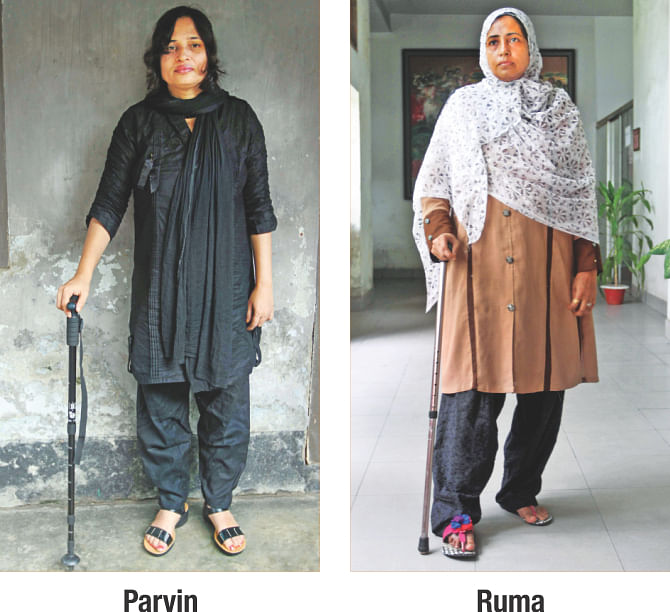Back from death, only to suffer
Back from death, only to suffer

Everyone thought they were dead as they lay like corpses on the spot of the August 21 grenade attack. They survived, however, proving doctors and rescuers wrong, but with a life they feel not worth living.
Even after 10 years, the miraculous return to life feels like a curse to Rashida Akhter Ruma and Mahbuba Parvin, two of the badly injured victims of the attack. Still today, they carry hundreds of splinters in their bodies.
Untold sufferings are a daily companion of not only Ruma and Parvin, but also of most of the injured who survived the 2004 attack.
It was 5:22pm that day when Awami League President Sheikh Hasina, the then leader of opposition, finished her speech at an anti-terrorism rally organised by her party on Bangabandhu Avenue. Suddenly, at least 13 grenades were hurled at the crowd, killing 24 leaders and activists and injuring more than 300 others.
Hasina, now prime minister, narrowly escaped death.
Talking to The Daily Star on Tuesday, Ruma, women affairs secretary of ward-69 unit of the AL, and Parvin, women affairs secretary of Dhaka Swechchhasebak League, recalled the fateful day and the brunt they still bear and will do so for the rest of their lives.
"I would have been saved had I died on August 21. Escaping death that day, I now taste the pain of death each and every moment of my life," said Ruma, who carries nearly 700 splinters in her body.
She exposed herself to a shower of incoming splinters trying to save Ivy Rahman by embracing her.
Ruma was so badly injured that after she was rushed to the Dhaka Medical College Hospital, doctors had initially declared her dead.
"But later a young woman named China from Mirpur saw my body moving under the shroud and informed [AL leader] Saber Hossain Chowdhury.
"He [Saber] informed the doctors and I was later shifted to Bangladesh Medical College Hospital for treatment," she added.
From there she was shifted to the National Institute of Traumatology and Orthopaedic Rehabilitation (Nitor), popularly known as Pongu Hospital, and then to a hospital in Kolkata.
But life has never been normal for Ruma again.
"When pain from the splinters intensifies, I go mad and break things. I cannot sleep at night," she said, adding that she had become a burden for her two daughters, whom she had to marry off at their early ages.
"I could not pay for my daughters' education, as I was crippled by the terrorist attack and I lost my husband [who died of natural causes a few years after the attack]."
Ruma, whose stomach was injured and later underwent surgery several times, cannot digest rice and has to live on bread.
Mahbuba Parvin is the woman whose photo appeared in many newspapers. She was seen lying among the corpses on Bangabandhu Avenue in a blood-stained golden silk sari, a black handbag lying across her chest, her mouth slightly parted and with a blank, lifeless look in her eyes.
She lives with 1,800 splinters in her body and two in her brain, which remains inoperable still today. She had come to the rally from Savar, where she lived.
"People thought I died on the spot. But my body showed signs of life after 72 hours," she told The Daily Star.
"I regained full consciousness after 25 days at a hospital in India," said Parvin, adding, "I survived but I still cannot sleep at night."
Describing how she keeps her family members awake all through the night with her howls of pain, Parvin said, "The 24 people who died in the attack are the lucky ones.
"I would have been the luckiest if my name too appeared on the death list. But I am an ill-fated woman as I survived and am living a cursed life. Those who died in the attack escaped from life-long sufferings."
Thanks to Prime Minister Sheikh Hasina, Ruma and Mahbuba have been able to carry on their medical treatment. But expect for Hasina, no-one ever cared to ask after them, they said.
They said party leaders and journalists contacted them a few days before and after August 21 every year.
On the trial of the grisly attack, both the victims demanded exemplary punishment of the perpetrators, saying it would bring some solace for them if they found justice in their lifetime.